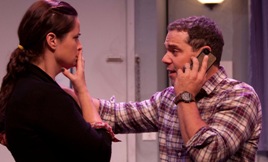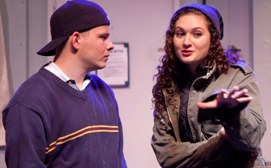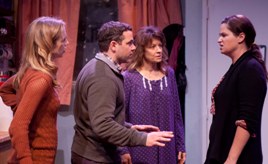
Let’s say your most recent play has won every major Best Production award in L.A. and you’re about to head back east to star in it off-Broadway. That would be one tough act to follow, wouldn’t it?
But follow it John Pollono has with Lost Girls, a night-and-day departure from the aforementioned Small Engine Repair, but a humdinger of a play in its own right, and one whose last five minutes elevate it to a whole new level of amazing.
 The scene is once again New Hampshire, Derry this time (with accents to match), and 30something Maggie wakes to find not only that a winter storm warning is in effect but that “some cocksucker” has just stolen her car, just about the worst possible news on this bad weather/bad luck day. Not only can Maggie not afford to take a day off work, the last thing she needs is a $500 deductible, not when she’s finally gotten rid of the latest “Mr. Useless” and begun getting her life—and that of her 17-year-old daughter Erica—back on track.
The scene is once again New Hampshire, Derry this time (with accents to match), and 30something Maggie wakes to find not only that a winter storm warning is in effect but that “some cocksucker” has just stolen her car, just about the worst possible news on this bad weather/bad luck day. Not only can Maggie not afford to take a day off work, the last thing she needs is a $500 deductible, not when she’s finally gotten rid of the latest “Mr. Useless” and begun getting her life—and that of her 17-year-old daughter Erica—back on track.
Maggie’s mood is hardly lightened when who should show up to take down the car theft report but her “Mr. Super Cop” ex-husband Lou, who has the nerve to have brought along his much younger blonde bimbo of a second wife Penny.
To make matters worse comes word that Erica has not shown up for school this morning, and the thought that she might be out in a today’s blizzard sends chills down Maggie’s spine.
 Cut to a cheap motel room, where it appears that Erica is on her way out of town, accompanied by a male classmate whom she’s picked to drive her to Florida because, as she puts it, “you’re so boring I knew you’d say yes.” As for the reason for this road trip, it appears she’s off to meet some “old dude” down south, a man we assume her mother knows not a whit about.
Cut to a cheap motel room, where it appears that Erica is on her way out of town, accompanied by a male classmate whom she’s picked to drive her to Florida because, as she puts it, “you’re so boring I knew you’d say yes.” As for the reason for this road trip, it appears she’s off to meet some “old dude” down south, a man we assume her mother knows not a whit about.
Over the course of Lost Girls’ intermissionless ninety minutes, we bounce back and forth between Maggie’s apartment and said motel room, as little by little what started out black comedy grows darker and more dramatic.
As in Small Engine Repair, much of the pleasure in Lost Girls comes from the various ways Pollono’s characters defy our first impressions of them. Take for instance Penny, who turns out to be no bimbo at all, or ex-violent drunk Lou, who proves that there is indeed such a thing as redemption.
 Then there’s Pollono’s deft way with dialog. A teenager explains the logic behind an improbable friendship: “She’s morbid. That’s why we’re friends.” The boy who’s got a crush on her says he finds her “funny, sweet, and mean … but in a nice way.” Penny describes the changed man Lou has become by telling Maggie, “People can outrun their demons.” Lou explains his inability to make Maggie see how he’s changed with the simple statement, “You make it tough to be vulnerable around you.”
Then there’s Pollono’s deft way with dialog. A teenager explains the logic behind an improbable friendship: “She’s morbid. That’s why we’re friends.” The boy who’s got a crush on her says he finds her “funny, sweet, and mean … but in a nice way.” Penny describes the changed man Lou has become by telling Maggie, “People can outrun their demons.” Lou explains his inability to make Maggie see how he’s changed with the simple statement, “You make it tough to be vulnerable around you.”
That’s not to say that that Lost Girls couldn’t benefit from some minor tweaking, with a first half-hour played so much for laughs that the transition into stark drama seems a bit too much of a tonal shift.
Still this is one smart, compelling play, with characters you come to care about and a denouement that not only takes it up to a whole new level, it makes Lost Girls the kind of play you want to see a second time with opened eyes.
 Under John Perrin Flynn’s incisive direction, the entire cast deliver rich, three-dimensional performances, beginning with Jennifer Pollono (Maggie) and Joshua Bitton (Lou), reunited from this past year’s hilarious Dirty Filthy Love Story and revealing themselves as dramatic actors of the first order in addition to their already proven comedic gifts. Bitton has never been better than he is as Lou, a demon-plagued ex-drunk with a great big heart of mush, and Pollono (the playwright’s wife) will win and break your heart at the same time.
Under John Perrin Flynn’s incisive direction, the entire cast deliver rich, three-dimensional performances, beginning with Jennifer Pollono (Maggie) and Joshua Bitton (Lou), reunited from this past year’s hilarious Dirty Filthy Love Story and revealing themselves as dramatic actors of the first order in addition to their already proven comedic gifts. Bitton has never been better than he is as Lou, a demon-plagued ex-drunk with a great big heart of mush, and Pollono (the playwright’s wife) will win and break your heart at the same time.
As for those high school runaways, Anna Theoni DiGiovanni and Jonathan Lipnicki (yes, that Jonathan Lipnicki, all grown up and teen-hunky) are perfection as tough girl and lovestruck boy who find themselves falling into the purest of loves despite her surfeit (and his lack) of experience in matters of sex and the heart.
Kirsten Kollender is equally memorable as smart blonde Penny, and Peggy Dunne (at the performance reviewed) proves a bona fide laugh-getter as Maggie’s crabapple of a mom.
Scenic designer David Mauer has created a wonder of a small-stage, low-budget set that manages magically to morph quickly back and forth into two distinctive rooms, aided by video designer Corwin Evans’ projections (a mashup of real and TV snow) and Jeff McLaughlin’s expert lighting. Caitlin Doolittle’s character-appropriate costumes and Peter Bayne’s mood-enhancing sound design complete a topnotch design package.
 A notice in the lobby warns of brief nudity, and we do see female breasts briefly, though not gratuitously. On a less explicable note is Lipnicki’s second or two of full frontal that takes place during a scene change. In other words, we see Lipnicki the actor—and not the character he is playing—take off his boxers to get naked in bed for a scene with DiGiovanni, only to have the character put his undershorts back on before getting out of bed. “Silly and distracting” is how a fellow audience member described this unscripted nudity, and I must concur.
A notice in the lobby warns of brief nudity, and we do see female breasts briefly, though not gratuitously. On a less explicable note is Lipnicki’s second or two of full frontal that takes place during a scene change. In other words, we see Lipnicki the actor—and not the character he is playing—take off his boxers to get naked in bed for a scene with DiGiovanni, only to have the character put his undershorts back on before getting out of bed. “Silly and distracting” is how a fellow audience member described this unscripted nudity, and I must concur.
Lost Girls is produced for Rogue Machine Theatre by Flynn and Rob Mersola (who wrote Dirty Filthy Love Story). Ramon Valdez is stage manager. Sara Fenton and Joey Long are assistant directors.
I was one of the last in L.A. to see Small Engine Repair (and award it Best Production, Best Direction, and Best Ensemble Scenies). This time round I’m one of the first to catch Lost Girls, and at the risk of jumping the gun, it could well earn even more Scenies than its predecessor. Like Small Engine Repair, Lost Girls is a play you’ll be talking and thinking about long after its final fadeout.
Rogue Machine at Theatre/Theater, 5041 Pico Blvd., Los Angeles.
www.roguemachinetheatre.com
–Steven Stanley
September 16, 2013
Photos: John Flynn
Tags: John Pollono, Jonathan Lipnicki, Los Angeles Theater Review, Rogue Machine Theatre, Small Engine Repair


 Since 2007, Steven Stanley's StageSceneLA.com has spotlighted the best in Southern California theater via reviews, interviews, and its annual StageSceneLA Scenies.
Since 2007, Steven Stanley's StageSceneLA.com has spotlighted the best in Southern California theater via reviews, interviews, and its annual StageSceneLA Scenies.







 COPYRIGHT 2025 STEVEN STANLEY :: DESIGN BY
COPYRIGHT 2025 STEVEN STANLEY :: DESIGN BY